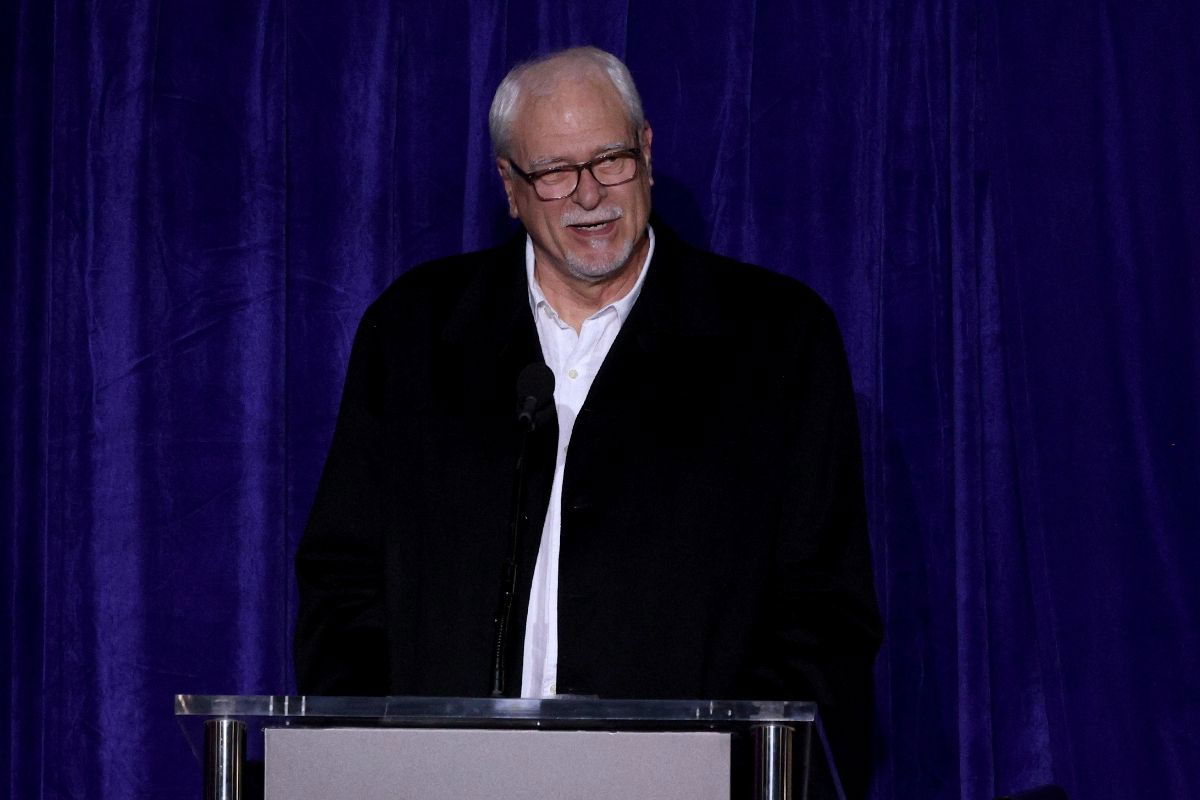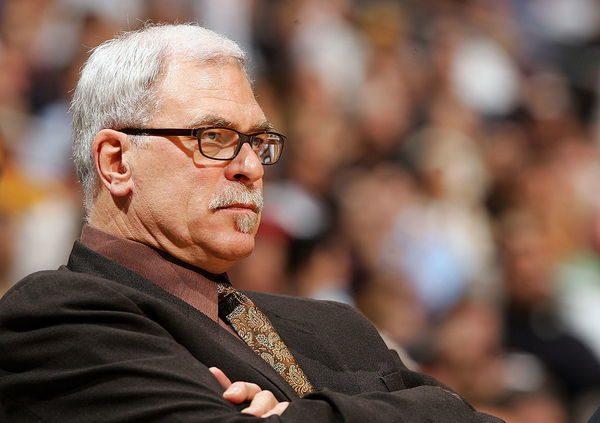
Imago
Feb 8, 2024; Los Angeles, CA, USA; Former Los Angeles Lakers head coach Phil Jackson speaks during a ceremony for the unveiling of a statue for former Los Angeles Lakers guard Kobe Bryant at Star Plaza outside of Crypto.com Arena. Joining him on stage are Vanessa Bryant and Stu Lantz. Mandatory Credit: Jason Parkhurst-Imagn Images

Imago
Feb 8, 2024; Los Angeles, CA, USA; Former Los Angeles Lakers head coach Phil Jackson speaks during a ceremony for the unveiling of a statue for former Los Angeles Lakers guard Kobe Bryant at Star Plaza outside of Crypto.com Arena. Joining him on stage are Vanessa Bryant and Stu Lantz. Mandatory Credit: Jason Parkhurst-Imagn Images
Basketball is all that Phil Jackson dreamt of and lived by. After his playing days ended, Jackson devoted himself to coaching, steering the Chicago Bulls to dominate the 1990s and later guiding the Los Angeles Lakers to multiple championships in the early 2000s. While he came close to achieving a three-peat with the Lakers, he ultimately fell short. Yet, his relentless dedication to the game came with a cost—one that began long before his coaching career.
Watch What’s Trending Now!
Injuries plagued Jackson throughout his playing days, leaving a lasting impact on his health. Early in his NBA career, Jackson suffered a herniated disc, followed by a fused lower back. These setbacks didn’t stop him from excelling on the court, but they laid the groundwork for further complications later in life. By his tenth year in the league, Jackson found himself taking on an unexpected challenge off the court: building his own house.
Teaming up with his brother and a close friend, Jackson immersed himself in the labor-intensive project. While rewarding, the physical toll was undeniable. Reflecting on that period, Jackson recalled, “Somewhere in my 10th year, I came back and was ready to start playing again. I hadn’t done a lot of workouts in the summer. I’d been building a house—kind of a personal challenge to collaborate with my brother and a friend of mine. And I came back, and I wasn’t able to dunk all of a sudden.”
ADVERTISEMENT

Getty
LOS ANGELES – FEBRUARY 13: Head coach Phil Jackson of the Los Angeles Lakers sits on the bench and watches the game against the Utah Jazz on February 13, 2006 at Staples Center in Los Angeles, California. NOTE TO USER: User expressly acknowledges and agrees that, by downloading and or using this photograph, User is consenting to the terms and conditions of the Getty Images License Agreement. (Photo by Lisa Blumenfeld/Getty Images)
The realization that he couldn’t perform even basic basketball maneuvers like dunking hit hard. He attributed the decline to the overuse of his dominant leg during the physically demanding house-building process. “This is my power leg,” Jackson explained, gesturing to his right leg. “Because I’m a left-hander, I needed to stop building [the house] and start building myself back up again.”
Jackson went on to play 12 seasons with the New York Knicks, but his injuries caught up with him over time. Decades later, the former champion—once known for his towering, athletic presence—relies on a cane for support. However, his enduring legacy as one of basketball’s greatest minds remains untarnished. When entrepreneur JT Foxx asked him about his impressive posture, the former coach the reason for his nagging issue.
ADVERTISEMENT
Why does Phil Jackson feel like a walking alarm?
Phil Jackson has faced a lifetime of physical challenges that few could endure. Over the years, Jackson has undergone multiple surgeries, including back surgery, knee replacement, and hip replacements on both sides. Despite his remarkable achievements on the court, his body has paid a steep price. Reflecting on the toll his injuries have taken, Jackson humorously described his predicament: “I’ve had this knee replaced. Both my hips replaced. So, you know, I’m a little bit of a walking alarm when I go through the airport.”
ADVERTISEMENT
One of Jackson’s most challenging periods came in 2006 when he was coaching the Lakers. Persistent pain in his right knee began to severely limit him. That year, he announced he would undergo right hip replacement surgery at Centinela Freeman Regional Medical Center in Inglewood. During his recovery, swimming became a source of both solace and rehabilitation, allowing him to stay active despite the pain. In his absence, assistant coach Kurt Rambis stepped in to lead the Lakers.
In an email, Jackson detailed the difficulties he faced that summer, “The pain got debilitating this summer. I could only exercise through swimming, which I enjoy immensely on the lake outside my doors. Pain management became the issue of the day, but with two daughters’ weddings this summer, I kept my eye on the prize until I could get back here after Labor Day and go through some diagnostics.”
Top Stories
Kyrie Irving Breaks Silence After Injury Return Update Emerges

Prayers Pour In For Napheesa Collier After Unfortunate Health Announcement

Michael Jordan Could Have Repaired Scottie Pippen Relationship if He Wanted To: Former Teammate

Is Austin Reaves Dating YouTuber SteveWillDoIt’s Ex-Girlfriend? Fact Checking Viral Claim

Is Giannis Antetokounmpo Playing Tonight? Bucks vs Hornets Latest Injury Report (Jan 2)

Initially, Jackson attributed his worsening condition to long-standing back issues from his playing days. However, further evaluation revealed discomfort in both hips as well. As if these challenges weren’t enough, Jackson was later diagnosed with prostate cancer, adding another hurdle to an already arduous journey. Despite the physical toll and medical setbacks, Jackson’s resilience and perseverance shine through. Even off the court, Jackson’s story remains one of triumph over adversity—a testament to his legendary status.
ADVERTISEMENT
ADVERTISEMENT
ADVERTISEMENT
ADVERTISEMENT

